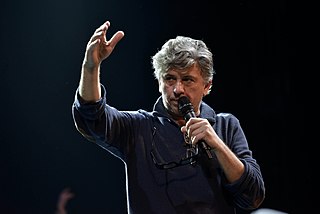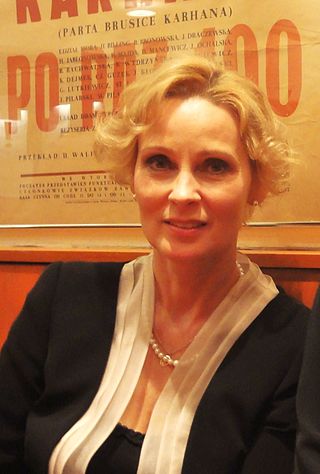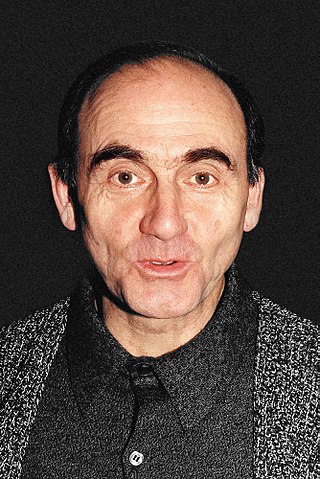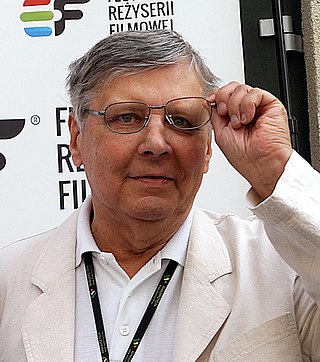
Andrzej Teodor Seweryn is a Polish actor and director. Regarded as one of the most successful Polish theatre actors, he starred in over 50 films, mostly in Poland, France, and Germany. He is also one of only three non-French actors to have been hired by the Paris-based Comédie-Française. In 2017, he received the Polish Academy Award for Best Actor for his portrayal of painter Zdzisław Beksiński in the biographical film The Last Family. In 2023, he was honoured with the Polish Academy Award for Best Supporting Actor for his performance in drama film Śubuk.

Zbigniew Hubert Cybulski was a Polish film and theatre actor, one of the best-known and most popular personalities of the post-World War II history of Poland.

Stefan Jaracz was a Polish actor and theater producer. He served as the artistic director of Ateneum Theatre in Warsaw during the interwar period (1930–32), and within a short period raised its reputation as one of the leading voices for Poland's new intelligentsia, with groundbreaking productions of Danton's Death by Georg Büchner (1931), The Captain of Köpenick by Carl Zuckmayer (1932), as well as popular Ladies and Husars by Aleksander Fredro (1932) and The Open House by Michał Bałucki.

Borys Michał Szyc-Michalak is a Polish film and theatre actor and musician. In 2010, he received the Polish Academy Award for Best Actor.

Andrzej Chyra is a Polish actor and theatre director. He is a member of the Polish Film Academy and the European Film Academy. In 2006, he received the Polish Academy Award for Best Actor for his performance in Feliks Falk's drama film The Collector.

Kazimierz Dejmek was a Polish actor, theatre and film director, and politician. During his career he managed the New Theatre in Łódź, the National Theatre, Warsaw, and the Teatr Polski, Warsaw. From 1993 to 1996 he served as Poland's Minister of Culture. In 1984 Dejmek was awarded the Witkacy Prize - Critics' Circle Award and in 1989 the Grand Cross of the Order of Polonia Restituta, one of his country's highest honours.

Andrzej Szczytko was a Polish actor and stage director. Szczytko is the recipient of multiple theatre awards and honours, including the 2016 Witkacy Prize - Critics' Circle Award. He was awarded the Decoration of Honor "Meritorious for Polish Culture" in 2012 for his contribution to Polish culture, and in 2017, the Silver Medal for Merit to Culture – Gloria Artis.

Jan Frycz is a film, television and stage actor. He was nominated for seven Polish Film Awards, winning three times for Best Supporting Actor in the films Pornografia (2003), The Welts (2004) and 25 Years of Innocence (2021).
Henryk Baranowski was a Polish theatre, opera and film director, actor, stage designer, playwright, screenwriter and poet. He is best known for his starring role in the film Dekalog: One directed by Krzysztof Kieślowski, and also appeared as Rosa's brother Josef in Rosa Luxemburg directed by Margarethe von Trotta and as Napoleon in Pan Tadeusz directed by Andrzej Wajda. He directed over 60 theater and opera productions in Europe, Russia and the US and was the Artistic Director of the Teatr Śląski in Katowice in the mid 2000s. He also directed four "television theatre" productions: ...yes I will Yes, For Phaedra (1998), Saint Witch (2003), and Night is the Mother of Day (2004).

Marian Kociniak was a film, television, voice and radio actor and comedian. He was best known from portraying Franciszek Dolas, a main character in the 1969 film How I Unleashed World War II. Kociniak also had main and secondary roles in films such as Morning Stars (1979), Danton (1983), Fucha, Bermuda Triangle (1987), Circus is Leaving (1987), Yesterday Goodbye (1993), Sir Thaddeus (1999), Kalipso (2000), and The Last Action (2009), as well as in television series such as Janosik (1974), Jan Serce (1981), Sukces (1995), and The Deep End (2013).

Janusz Józefowicz is a Polish director, choreographer, actor and dancer. He is the director and choreographer of the musical Metro.

Maria Gładkowska is a Polish film, stage, and television actress. She gained critical acclaim in the 1980s that culminated in her Zbigniew Cybulski Award (1988). Gładkowska portrayed Daisy, Princess of Pless, her breakthrough performance in Magnat (1987), which was included in the list of 100 Best Polish Films of all time.

Jan Peszek is a Polish theatre, film, and television actor. Although primarily involved in theatre work, he has appeared in more than sixty films since 1970. He is most well known for his work with dramaturgist Bogusław Schaeffer.

Andrzej Adam Zaorski was a Polish actor and cabaret artist, appearing in television, film and theater, as well as on the radio. He was the son of Tadeusz Zaorski, the brother of film director Janusz Zaorski, and the father-in-law of satyrist Andrzej Butruk.
Michał Englert is a Polish cinematographer and screenwriter from Warsaw.

Bartosz Bielenia is a Polish film and stage actor.

Adam Franciszek Józef Siedlecki or Adam Grzymała-Siedlecki (AGS) (1876–1967) was a Polish literary and theater critic, playwright, translator, prose writer and director.

Julia Kijowska is a Polish actress. Her notable films include In Darkness (2011), The Mighty Angel (2014), and United States of Love (2016). The daughter of the director Janusz Kijowski, she studied acting at the Aleksander Zelwerowicz National Academy of Dramatic Art in Warsaw and began her career in theatre productions.

Konrad Ksawery Swinarski was a Polish theatrical, television, film and opera director and stage designer.

Wojciech Paszkowski was a stage, film, television and voice actor, and dubbing director.


















